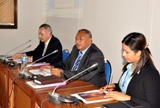Oil, Agriculture and Rural Development discussed on the first day of the Timor-Leste and Development Partners Meeting

The Timor-Leste and Development Partners Meeting (TLDPM) allowed for the discussion of topics such as oil, agriculture and rural development, tourism, infrastructure, banking, finance and social sectors (health and education), which were divided into six respective roundtables.
The open discussion of the three initial themes, related to the strategic growth sectors, was scheduled in the agenda of the second day of the event.
The first roundtable had the theme of the petroleum issue. The discussion was led by the Secretary of State for Natural Resources Alfredo Pires, and was attended by the World Bank, the National Petroleum Authority (NPA) and representatives of Norway and of the civil society.
Discussions were held on the importance of human resource development and the project for the development of the South Coast, which includes a supply base for processing oil and gas onshore and consequences for other industries (agribusiness and petrochemical).
The Extractive Industries Transparency Initiative was also commented and the establishment of a national oil company was encouraged for the proper management and development of the oil sector institutions.
On the other hand, accountability, investment diversification of the Petroleum Fund and the possibility to establish infrastructure projects with local communities to generate more jobs and boost local business, are aspects that were also addressed.
The Minister of Agriculture and Fisheries, Mariano Sabino, chaired the roundtable whose theme was precisely Agriculture and Rural Development, attended by representatives of USAID, FAO, European Union, and Peace Dividend Trust and Kibur Mata Dalan.
It was stressed that there is a need for infrastructure and human resources growth as to help farmers to increase productivity and establish contacts with buyers.
All noted the importance of agriculture as a key to economic development, the importance of the link between national producers and buyers, both national and foreign, in order to maximize the export of products and allow access to international markets.
The private sector, also represented, confirmed this view by adding the need to establish an agricultural bank, with State support to allow farmer access to bank loans.
The third roundtable with the theme of tourism, under the leadership of the Minister of Tourism, Commerce and Industry Gil Alves, was attended by representatives of the Chamber of Commerce and Industry, Timor-Leste Development Agency and the Portuguese Cooperation.
Tourism was seen as a pillar to replace non-sustainable sectors, thus investment in this area is extremely important. Infrastructure is undoubtedly the key for development and also human capital training is considered strategic and vital for the growth of Timor-Leste’s tourism.
Investment in infrastructure encourages private investment, which can take advantage of these services and allow it to grow. At the same time, the development of practical training in areas such as hospitality is crucial to increase knowledge of the Timorese and is fundamental to keep the community engaged.
In short, tourism is a source of wealth and a way to reduce the country's economy dependance on petroleum.
The Minister of Finance Emília Pires, made the discussion conclusions of the day.










































